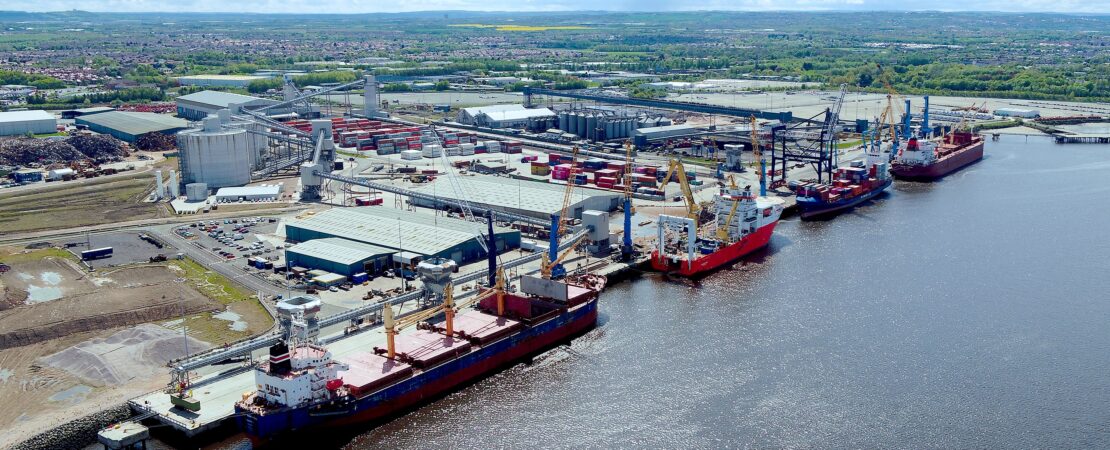Port of Tyne to demonstrate blueprint for decarbonisation of UK ports
The Port of Tyne will unveil a new sustainable smart port platform that will provide a blueprint for its transition to net zero at an event held at its Maritime 2050 Innovation Hub on Wednesday 6 April.
As part of the Clean Tyne Project, the Port of Tyne and Siemens have worked with Connected Places Catapult, Newcastle University and the North East LEP to deploy a real-time digital platform for scenario planning and feasibility studies that will help determine the future power needs of the Port. Understanding its current and forecast power usage as well as its infrastructure opportunities will enable the Port to define its path to decarbonisation – and ultimately achieve its vision of becoming a net-zero port by 2050, part of the Port’s overall Tyne 2050 strategy for growth.
The Clean Tyne project was granted funding by the Department of Transport to create a blueprint for the decarbonisation of the UK’s ports. The project is part of the Clean Maritime Demonstration Competition, which sees £30m in total invested in a number of initiatives to reduce emissions from the maritime sector.
The project consortium has built on its extensive technical expertise, academic research and wider industry knowledge to integrate multi-vector renewable energy information into the purpose-built digital port platform. This allows the partners to determine which renewable energy implementations will offer the greatest benefits to the Port and what capacity it will need from the grid going forward ensuring the optimisation and resilience of clean energy supplies for shore power, land-based infrastructure and other use cases.
By using this form of planning, the Port of Tyne can evaluate the benefits of introducing new technology solutions before implementing them, thus minimising risk. The planning will focus on multiple areas including optimised operations, grid compliance and flexibility, enhanced communications using 5G, the electrification of shipping and logistics, the reduction or avoidance of fossil fuels and the development of new digital skills.
Testbed for other UK ports
The digital platform will play a fundamental role throughout the Port’s decarbonisation journey by supporting the creation of business cases, budget planning and investment cases. It will also allow the project consortium to assess the technical, environmental and economic impact of the Port. Using the Port of Tyne as a testbed, the Clean Tyne project’s digital energy platform has enabled Siemens and its partners to develop a universal blueprint for decarbonisation that can be replicated in other port environments as well as other industries.
The event on 6 April will be held in-person and online. To register to attend the event, visit Port of Tyne – Clean Tyne Project | Eventbrite
Quotes from the project partners
“The success of the Clean Tyne project is testament to the expertise, research and collaboration of the consortium. The project outputs show real benefits to decarbonisation efforts across the UK Port Sector and will be the backbone for future developments in that space. This tool will be pivotal for the Port of Tyne to achieve its ambitious decarbonisation and environmental targets, and we are already exploring how we can expand the benefits further. Using the 2050 Innovation Hub at the Port of Tyne, the first of its kind aligned to Maritime 2050, has given us the perfect platform to demonstrate and disseminate the learnings and outputs with all ports in the UK.” Ian Blake, Head of Innovation and Technology at the Port of Tyne
“There are hundreds of ports across world, all burning a lot of diesel and impacting the environment. Through the Clean Tyne project with the Port of Tyne we have been able to undertake an advanced feasibility study and to create a dependable and scalable roadmap for the decarbonisation of ports worldwide.” Ian Lloyd, Head of Microgrid Solutions, Siemens
“This project is a great example of how digital technologies can be applied to drive decarbonisation of our regional infrastructure. North East LEP via the North East Energy Catalyst will work to share the results of the project and help other ports and industries learn from the findings in the Clean Tyne project.” David Lynch, Energy Innovation Partnerships Manager – North East LEP
“Through the Clean Tyne project, we have been able to apply novel concepts of digitalisation in real-world energy systems to help identify solutions for ports that cut across energy systems, marine transport, and data – all helping reduce carbon emissions. We are excited to have the opportunity to present the findings to the wider maritime community.” Dr Haris Patsios, Senior Lecturer in Power Systems, Newcastle University
“Ports are critical stakeholders in the future clean energy transition at sea and on land. Access to and supporting renewable energy sources such as solar, wind and tidal so ports become energy hubs across multiple modes of transport; is vital if we are to accelerate our journey to net zero. This has been an exciting project that demonstrated how digital infrastructure helps make greener ports possible. The Port of Tyne now has a set of clear next steps and we have invaluable transferable insight for ports across the UK.” Paul Wilson, Chief Business Officer, Connected Places Catapult
Ends.
Notes to editors
The Clean Tyne – UK Blueprint for Decarbonisation project is part of the Clean Maritime Demonstration Competition, funded by the Department for Transport and delivered in partnership with Innovate UK.
Announced in March 2020, and part of the Prime Minister’s Ten Point Plan to position the UK at the forefront of green shipbuilding and maritime technology, the Clean Maritime Demonstration Competition is a £20m investment from government alongside a further c.£10mfrom industry to reduce emissions from the maritime sector. The programme is supporting 55 projects across the UK, including projects in Scotland, Northern Ireland and from the South West to the North East of England. As set out in the Clean Maritime Plan (2019), Government funding has been used to support early-stage research relating to clean maritime. The programme will be used to support the research, design and development of zero emission technology and infrastructure solutions for maritime and to accelerate decarbonisation in the sector.
About the consortium partners
Port of Tyne is one of the UK’s major deep-sea ports – operating in bulk and conventional cargo, car terminals, cruise & ferry, port centric logistics and estates. Overall, the Port of Tyne enables £557 million to be added to the North East economy, supporting 9,300 jobs directly and indirectly. The Port’s cruise and ferry business adds another £57 million to the local economy and 1,600 jobs.
Port of Tyne was recently awarded two Maritime UK 2020 Clean Energy Awards for Clean Energy Operator and Clean Energy Enabler.
One of the UK’s largest trust ports and entirely self-financing, the Port receives no Government funding, is run on a commercial basis and reinvests all profits back into the Port for the benefit of all of its stakeholders.
As one of only two deep sea ports in the North East of England, 83% of the world’s largest cargo ships can be accommodated at the Port of Tyne.
During a decade of development, the Port of Tyne has invested over £130 million in diversifying its operations to handle a growing range of commodities.
Siemens Smart Infrastructure (SI) is shaping the market for intelligent, adaptive infrastructure for today and the future. It addresses the pressing challenges of urbanization and climate change by connecting energy systems, buildings and industries. SI provides customers with a comprehensive end-to-end portfolio from a single source – with products, systems, solutions and services from the point of power generation all the way to consumption. With an increasingly digitalized ecosystem, it helps customers thrive and communities progress while contributing toward protecting the planet. SI creates environments that care. Siemens Smart Infrastructure has its global headquarters in Zug, Switzerland, and has around 71,000 employees worldwide.
Connected Places Catapult is the UK’s innovation accelerator for cities, transport, and places. We provide impartial ‘innovation as a service’ for public bodies, businesses, and infrastructure providers to catalyse step-change improvements in the way people live, work and travel. We connect businesses and public sector leaders to cutting-edge research to spark innovation and grow new markets. We run technology demonstrators and SME accelerators to scale new solutions that drive growth, spread prosperity, and eliminate carbon.
Newcastle University, UK, is a thriving international community of some 27,750 students from over 130 countries worldwide.
As a member of the Russell Group of research-intensive universities in the UK, Newcastle has a world-class reputation for research excellence in the fields of medicine, science and engineering, social sciences and the humanities.
Its academics are sharply focused on responding to the major challenges facing society today. Our research and teaching are world-leading in areas as diverse as health, culture, technology and the environment.
The Research Excellence Framework 2014 (REF) placed Newcastle University 16th in the UK for Research Power and the vast majority of our research (78%) was assessed to be world-leading or internationally excellent.
Newcastle University is committed to providing our students with excellent, research-led teaching delivered by dedicated and passionate teachers. This is reaffirmed by achieving the best possible outcome – a Gold Award – in the Teaching Excellence Framework (TEF).
Newcastle is placed joint 146th in the world and in the top 20 in the UK in the latest Times Higher Education World University Rankings.
The North East Local Enterprise Partnership (North East LEP) is a public, private and education sector partnership. We are one of thirty-eight LEPs in the country and are responsible for promoting and developing economic growth in the local authority areas of County Durham, Gateshead, Newcastle, North Tyneside, Northumberland, South Tyneside and Sunderland. We produce our area’s Strategic Economic Plan, which acts as a blueprint for the activities that need to take place to improve our economy.



